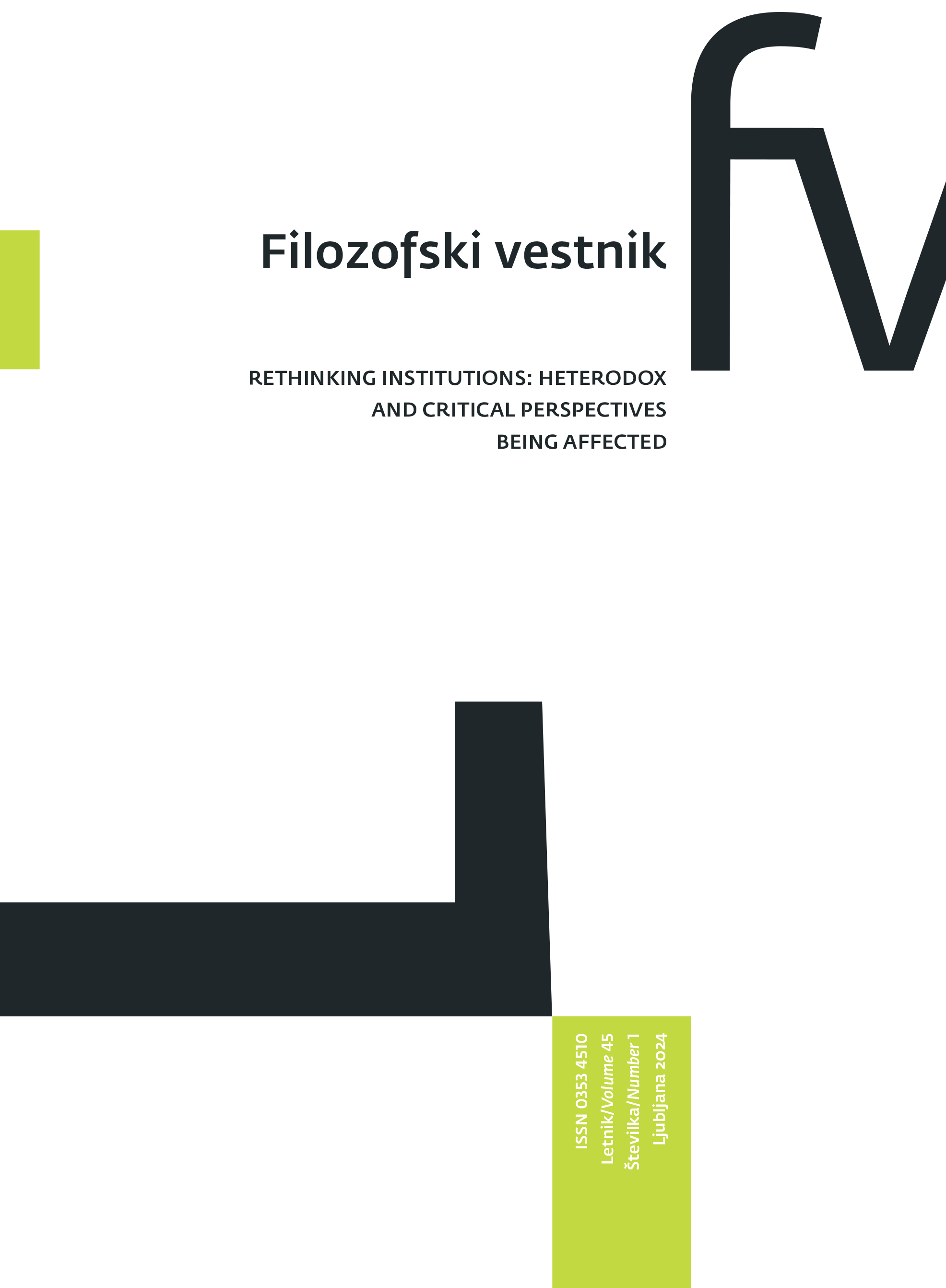Kaj ima ljubezen s tem?
Badioujeva scena Dvojega z vidika Lacanovih formul seksuacije
DOI:
https://doi.org/10.3986/fv.45.1.11Ključne besede:
ljubezen, politika, seksuacija, Lacan, Badiou, emancipacijaPovzetek
Badioujeva filozofija se ukvarja z vprašanjem radikalne spremembe, predvsem v povezavi z ljubeznijo in emancipatorno politiko. Vseeno pa Badiou opozarja, da se ljubezen in politika ne prepletata in ju je treba obravnavati ločeno. V nasprotju s tem so se novejši komentarji v veliki meri opirali na Lacanovo teorijo seksuacije in ljubezni in jo postavljali v razmerje s politiko (zlasti Žižek in Zupančič). Presenetljivo je, da Badiou, ki je izrazito politični mislec in je obenem pod močnim vplivom Lacana, razpravlja o spolnosti le v povezavi z ljubeznijo, sam koncept spolnosti pa ločuje od politike. V pričujočem prispevku proučujem Badioujev koncept ljubezni v luči Lacanovih formul seksuacije. Najprej preučim Badioujeva koncepta ljubezni in politike v razmerju do seksuacije, nato ju primerjam z Lacanovimi formulami, da bi na koncu ponazorila politični pomen ljubezni.
Prenosi
Literatura
Badiou, Alain. Alain Badiou par Alain Badiou. Paris: PUF, 2021.
Badiou, Alain. Conditions. Translated by Steven Corcoran. London: Continuum, 2008.
Badiou, Alain. Éloge de l’amour. Paris: Flammarion, 2009.
Badiou, Alain. L’être et l’événement. Paris: Seuil, 1988.
Badiou, Alain. “The Scene of Two.” Translated by Barbara Fulks. Lacanian Ink 21 (Spring 2003): 42–55.
Barnard, Suzanne. “Tongues of Angels: Feminine Structure and Other Jouissance.” In Reading Seminar XX: Lacan’s Major Work on Love, Knowledge, and Feminine Sexuality, edited by Suzanne Barnard and Bruce Fink, 171–86. Albany: State University of New York Press, 2002.
Brousse, Marie-Hélène. Mode de jouir au féminin. Paris: Navarin, 2020.
Burchill, Louise. “Of a Universal No Longer Indifferent to Difference: Badiou (and Irigaray) on Woman, Truths, and Philosophy.” Philosophy Today 62, no. 4 (Fall 2018): 1165–87. https://doi.org/10.5840/philtoday201937250.
Fink, Bruce. “Knowledge and Jouissance.” In Reading Seminar XX: Lacan’s Major Work on Love, Knowledge, and Feminine Sexuality, edited by Suzanne Barnard and Bruce Fink, 21–46. Albany: State University of New York Press, 2002.
Godard, Jean-Luc, director. Masculin Féminin. Anouchka Films-Argos Films, Sandrews--Svenskfilmindustri, 1966.
Grigg, Russell. “Lacan and Badiou: Logic of the Pas-Tout.” Filozofski Vestnik 26, no. 2 (2005): 53–65.
Lacan, Jacques. On Feminine Sexuality, The Limits of Love and Knowledge: Encore, 1972–1973. Translated by Bruce Fink. The Seminar of Jacques Lacan, edited by Jacques-Alain Miller, book 20. New York: W. W. Norton, 1998.
Le Gaufey, Guy. Le Pastout de Lacan: Consistance logique, conséquences cliniques. Paris: Epel, 2006.
Park, Youngjin. On Love: Between Lacan and Badiou. PhD diss., University of Toronto, 2018.
Van de Vijver, Gertrudis. “De durf van onbeslistheid.” In Dates with Gender and Diversity: Huldeboek voor Marysa Demoor, edited by Marianne Van Remoortel, Leah Budke, and Eloise Forestier, 281–3. Gent: Skribis, 2021.
Van de Vijver, Gertrudis. “Het gaat er niet om gelijk te hebben, het gaat erom niemand te laten vallen.” VSTN, no. 2 (Summer 2023): 40–42.
Zombies, The. “She’s Not There.” By Rod Argent. Released July 24, 1964, as the first single from the album The Zombies. Parrot PA 61001.
Žižek, Slavoj. Sex and the Failed Absolute. New York: Bloomsbury Academic, 2019.
Zupančič, Alenka. What is Sex? Cambridge: MIT Press, 2017.
Prenosi
Objavljeno
Kako citirati
Številka
Rubrike
Licenca
Avtorske pravice (c) 2024 Avtorji

To delo je licencirano pod Creative Commons Priznanje avtorstva-Deljenje pod enakimi pogoji 4.0 mednarodno licenco.
Avtorji jamčijo, da je delo njihova avtorska stvaritev, da v njem niso kršene avtorske pravice tretjih oseb ali kake druge pravice. V primeru zahtevkov tretjih oseb se avtorji zavezujejo, da bodo varovali interese založnika ter da bodo povrnili morebitno škodo.
Podrobneje v rubriki: Prispevki





